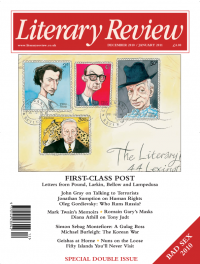Simon Hoggart
Do I Smell Roses?
Liquid Memory: Why Wine Matters
By Jonathan Nossiter
Atlantic Books 262pp £14.99
All wine writers face the same problem: how on earth do you describe the stuff? There is the approach rapturous: ‘do I smell roses? Can I detect white truffles? Cedar, lavender, slate and an ebullient dash of lychees …’. There is the approach over-the-top. I once saw a wine plugged at Majestic as having ‘notes of cinnamon and vanilla, with an undertone of Nivea crème’. There are writers who regard – and I am not making this up – ‘cat’s pee’ as a perfectly useful description of an element in a wine’s taste.
Or you can club your readers over the head with science, packing in details about malolactic fermentation and dégorgement. This is a quick way to lose any audience you may have. As wine writer for The Spectator magazine, I often find myself sighing and wondering if it would

Sign Up to our newsletter
Receive free articles, highlights from the archive, news, details of prizes, and much more.@Lit_Review
Follow Literary Review on Twitter
Twitter Feed
It wasn’t until 1825 that Pepys’s diary became available for the first time. How it was eventually decrypted and published is a story of subterfuge and duplicity.
Kate Loveman tells the tale.
Kate Loveman - Publishing Pepys
Kate Loveman: Publishing Pepys
literaryreview.co.uk
Arthur Christopher Benson was a pillar of the Edwardian establishment. He was supremely well connected. As his newly published diaries reveal, he was also riotously indiscreet.
Piers Brendon compares Benson’s journals to others from the 20th century.
Piers Brendon - Land of Dopes & Tories
Piers Brendon: Land of Dopes & Tories - The Benson Diaries: Selections from the Diary of Arthur Christopher Benson by Eamon Duffy & Ronald Hyam (edd)
literaryreview.co.uk
Of the siblings Gwen and Augustus John, it is Augustus who has commanded most attention from collectors and connoisseurs.
Was he really the finer artist, asks Tanya Harrod, or is it time Gwen emerged from her brother’s shadow?
Tanya Harrod - Cut from the Same Canvas
Tanya Harrod: Cut from the Same Canvas - Artists, Siblings, Visionaries: The Lives and Loves of Gwen and Augustus John by Judith Mackrell
literaryreview.co.uk